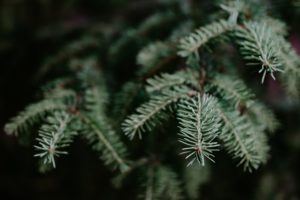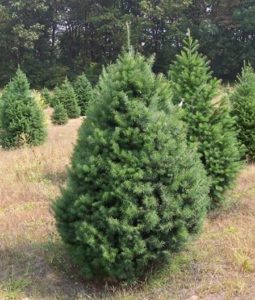There are so many different options when it comes to purchasing a Christmas tree which can make it hard to know which type of tree is best for your family and home. We’ve compiled the best Christmas trees for common complaints and preferences, such as trees for small spaces, trees that won’t drop a bunch of needles, and trees with the best Christmas scent. Read on to find out what type of Christmas tree is best for your situation.
Last For Months
If you’re looking for a Christmas tree that will last from Thanksgiving to past New Years it may be best to choose an artificial tree. Artificial trees are easy to set up, never drop their needles, and can be kept up as long as you’d like. To make an artificial tree feel more like a real Christmas tree, hide evergreen car air fresheners from the internal branches of the tree.
If your family has their heart set on a real Christmas tree, the Noble Fir (Abies procera) is probably the best option. Out of the popular Christmas tree options, Noble Firs last the longest, about six weeks. Frasier Firs (Abies fraseri) are also a good option lasting about five weeks.

Great For Small Spaces:
If you have a small apartment or home it may be hard to make room for a Christmas tree without removing pieces of furniture. But don’t give up just yet; there are certain types of Christmas trees that are thin and compact which may work for your small space. Fraser Firs (Abies fraseri) and Balsam Firs (Abies balsamea) both tend to have a slender profile which makes them great for small spaces. Balsam Firs only reach about 1.5 feet in diameter, while Fraser Firs reach 1-1.5 foot in diameter making it easy to find room for these Christmas trees in your home.

Can Hold Heavy Ornaments
Have you ever gotten your Christmas tree back home just to start decorating and find out it won’t support your favorite ornaments? This is because trees with soft, flexible branches aren’t strong enough to support heavy ornaments. If you have lots of heavy ornaments to hang we suggest opting for Christmas trees that have stronger, stiff branches. Fraser Fir (Abies fraseri), Scotch/Scots Pine (Pinus sylvestris), Norway Spruce (Picea abies), Colorado Blue Spruce (Picea pungens) and White Spruce (Picea glauca) all have branches capable of supporting heavy ornaments and lights.

Won’t Drop Many Needles
We’ve all been driven crazy by Christmas trees that constantly drop their needles. One of the best ways to avoid excess needle drop this year is to pick a tree that is known for its needle retention. Varieties such as the Nordmann Fir (Abies nordmanniana) and Fraser Fir (Abies fraseri) and Balsam Fir (Abies balsamea) may cost a little more but their needle retention is worth the increase in price. Virginia Pines (Pinus virginiana), Scotch/Scots Pine (Pinus sylvestris), and Colorado Blue Spruce (Picea pungens) are also known for their good needle retention. Keeping your Christmas tree hydrated and away from heaters can also help reduce needle drop.

The Best Scent
For some people, the scent is what makes the tree. Luckily, there are a lot of options for Christmas tree scent lovers. For a classic Christmas tree scent, opt for a Balsam Fir (Abies balsamea), Noble Fir (Abies balsamea), or Fraser Fir (Abies fraseri). Douglas Fir (Pseudotsuga menziesii) is also great for a classic, sweet Christmas scent. For something a little more unique go for a White Fir (Abies concolor) which has a citrus smell.

If the scent of your Christmas tree is important to you definitely avoid the White Spruce (Picea glauca), Colorado Blue Spruce (Picea pungens), and Leyland Cypress (Cupressus × leylandii). White and Blue Spruces generally don’t have much fragrance; however, if their needles are broken they give off a very unpleasant smell. For those that are sensitive to smells, Leyland Cypress is a good option since it does not give off any aroma.

Now that you know what Christmas Trees are best for specific preferences and situations; What type of Christmas Tree will you choose?


